Urs Fischer mulled over the first question he’d been asked, before speaking slowly. Very slowly. He placed his words deliberately, like a master builder laying a cornerstone. Because on top of them would come everything else, and if you get the first piece wrong then at some point the whole damn edifice will collapse.
But he’d just been asked how he was.
“Good…”
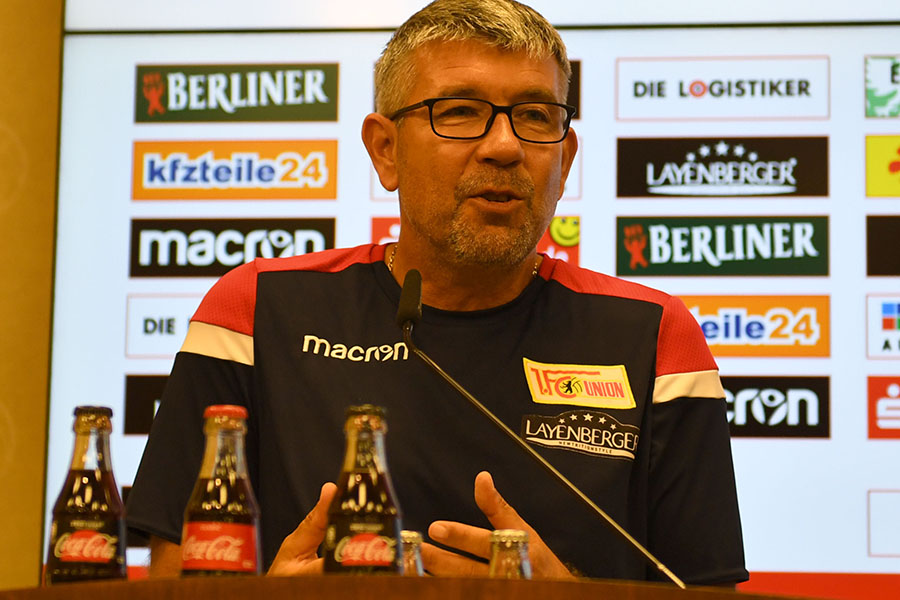
Fischer paused for what felt like an hour but which can only have been less than a second in the real world, out there in the blazing sunshine that was starting forest fires and setting off old munitions alongside the Autobahns, and that had been turning his training sessions into hellish tests of character and determination.
“…I’m… very… good.”
And he was good, because at last things were about to get going in earnest. He was now only 48 hours away from watching the first 1.FC Union side he has assembled take to the pitch of the Alte Försterei in the league. For the first time it mattered, and he was happy to be able to get on with the actual business of playing and winning games of football. Even though he had to measure his words to make sure they could be understood by these people in this press conference. These people who spoke what looked written down like the same language as his, but that came out so differently. Whose hardened consonants clashed against each other in a way that his softened, soothing ones never could. His S’s were long whispered Shhhh’s. His A’s were rounded, plump O’s.
He toyed with a cheap white pen in his right hand for a time. Fischer played almost 350 games as a professional footballer. Over 30,000 minutes on the pitch, so he will still always be a footballer, and they never really know what to do with their hands. A footballer’s hands are like a dancer’s eyes. They tell the truth, while the rest of their finely tuned body projects that ultimate confidence and competence and concrete, sure-as-shit certainty that allows them to succeed at all. He put his hands on his hips. He rested them on the lectern in front of him. He picked the pen up again, moving it between his fingers as he answered the questions put to him by the handful of journalists present without ever really looking his interlocutors in the eye.
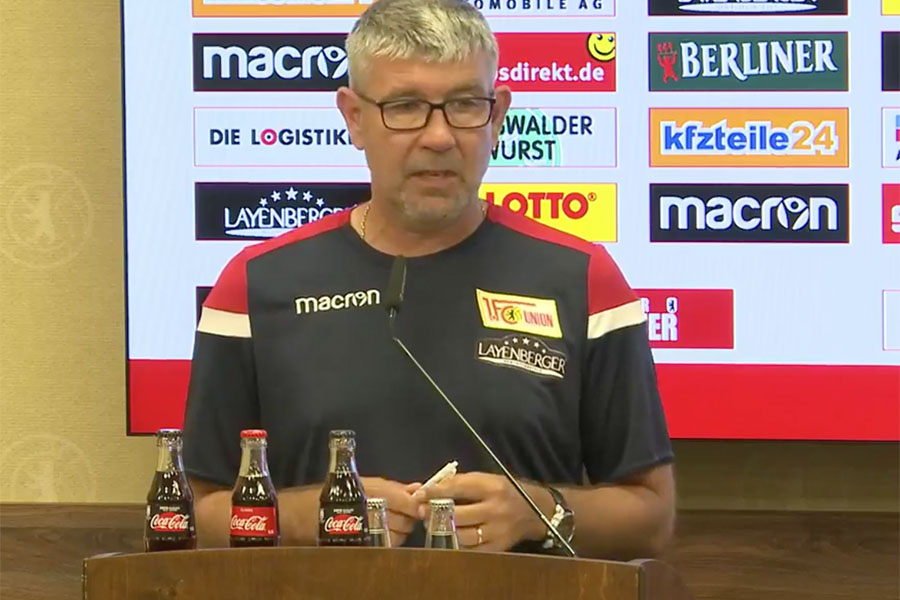
The best question came a little later on, when Mathias Bunkus asked if he would still get nervous before a game. Bunki has been coming here long enough to know what he was really asking. He’s been writing about Union since the Regionalliga. He was really asking if Fischer had the drive and the guts to see this through. If this disarming Swiss, whose accent flits like a butterfly through the air, and whose delightful thoughtful pauses could be divined as being either charming or calculated, was cut out for this place where they value steeliness – eisern – as highly as anything else.
Fischer gave the right answer. The one that any musician will give before they become jaded and cynical.
“The day I stop being nervous before a game is the day I will give up.”
For, he explained, nerves are just a sign that you are on your toes. That this matters. And he was a center-half, after all. If he was plagued with existential angst he would never have played all of those games. As Epictetus, the great Greek Stoic said:
No man is free who is not a master of himself.
He wasn’t paralysed in thought. He just had a little natural adrenaline to sharpen his focus. He could see clearly what needed to be done, and he wouldn’t be up all night sweating. Unless it was because of the damn heat.
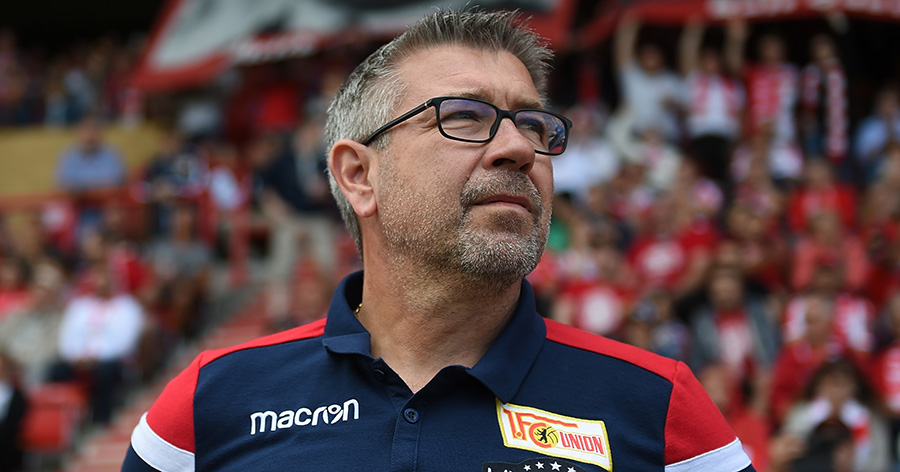
– – – – – –
Urs Fischer scored eleven league goals in his long career as a professional footballer, and, presumably, he can remember every one of them. His ex-defender predecessors at Union, Uwe Neuhaus and Jens Keller, certainly could. They could bring those goals back in a blink of an eye. They had to, for they came so rarely.
He’d probably say the double he scored away against Basel was more important. Or his first, against Chaux-de-fonds, was more joyous. But if there is one goal that stands out, one goal that you would have wanted to score had you the skill and the drive and the belligerence to make it as a professional footballer at all, it would be his equaliser against Celtic in the UEFA Cup at a bear pit of a Parkhead twenty years ago. FC Zürich were 1-0 down but were pressing Celtic back, working their way into the gaps created by Tommy Boyd’s pointless sending off like a tree’s roots under the surface of an aging, cracking pavement. Fischer wandered out to the left where he hit the ball, dipping and looping, back across goal where it dropped perfectly inside the back post. He was immediately buried by his team-mates, beaming and disbelieving at the same time. Reveling in the joy of their friend and protector – their defender! – and his moment.
Celtic park was stunned, livid and, for a moment, compellingly silent. The Guardian described it as a “freak” goal the next day, but that was unfair. For Fischer still had to be there and he still had to hit the thing. He still had to have the nous and experience to know that there would be a gap as big as an ocean somewhere near the goal, and if one of his team-mates wasn’t wandering into it at that moment, then maybe, just maybe, the ball would still just sail all the way over them all, past the despairing, back-pedaling keeper, Jonathan Gould, and into the goal.
He remembers his debuts as a manager, too. He was asked about them on Friday. Naturally, it took a moment, though, before nailing it. “Good memory, eh,” he joked. He was relaxing into this, but of course he remembered. Fischer lost all three games he had in charge of his beloved FC Zürich as caretaker boss before taking over full time the next season.
He did, however, win his first game in charge of FC Thun. But newspaper reports of the game say that he was already getting worked up on the touchline before things had even really got going. He was still getting used to a life where the ultimate control on the pitch would be left up to someone else. His hair had already started the transition to going grey.
Fucking strikers, he thought to himself, bristling there next to the pitch. They’ve only got one job. The newspaper report of the game lapped it up. They loved in the fact that he was a player’s coach, that he loved to train more than anything, and that he got so animated, so worked up on the touchline.
It’s hard. It’s hard to have played so many competitive games at the heart of central defence, where you can watch every action and reaction on the pitch, where you are relied upon like no-one else. Where your bravery comes alongside your anticipation as the most important of traits. He let rip at his striker when it had all got too much to take.
„Schiesst doch endlich!“
„Just shoot!“, he shouted in his nightingale sing-song Swiss.
– – – – – –
Up there, behind the lectern in the all-too-bright press room at the Alte Försterei, he didn’t look like a former centre-back. Not like Neuhaus and Keller did. Where Neuhaus looked grizzled and tough and uncompromising, and Keller looked ripped and lithe and ever alert, Fischer looks shorter than he should, somehow. He’s allowed himself to relax into his body, His top teeth are visible when he smiles and his normally spiked hair had been flattened forwards for this. His family is a long way away. He misses them, of course, but he has also been busy. His routine since getting to Berlin has just been “hotel, office, hotel, office, training camp, office, hotel…” and on and on in perpetuity.
Then he mentions that he is rarely happier than when he is fishing. It is a delight to think of this man who is just shorter and just chubbier than you expect him to be, in complete contemplative silence. Not like Hemingway, who saw fishing as just another fight to be won against nature. But like a monk. Like Janosch’s little bear. Catching one fish to eat and another one to spare its life.
It is a fantasy, a nonsense, certainly. Because one doesn’t play that many games of football through a harmonious oneness with the universe. What would Christian Beeck say if he thought someone was going through the motions, playing the game without the necessary brutality?
But sometimes, though, as the world is fresh with the optimism of a new start, we can allow ourselves the indulgence of a fantasy. Fischer’s beady eyes, the ones behind thin black rimmed glasses, are undoubtedly the windows on a hard, hard working and driven man. But that can wait. That can wait til after the first game on Sunday against Aue. Which he wants to win, of course, even though he says that “stability” is the first thing Union need, and in that he is absolutely right.
Union are likely to start with new players right up the middle of the team. The fundamentals upon which everything else is based. The part that a centre-back understands best, the spine. From Rafal Gikiewicz in goal, Ken Reichel at the back, Manuel Schmiedebach in midfield and with Sebastian Andersson up front. Yes, he wants a win, but he needs to know that his side can play, first.
– – – – – –
Fischer was at his most florid when talking about Christopher Trimmel. He said he was happy that the players had chosen him to be captain in a vote. And he wasn’t surprised. It was, he said, the perfect choice and he was happy to go along with it. Trimmel himself had only left the stadium about twenty minutes before, suntanned and relaxed looking, in his shades and his casuals, shorts and thin T-Shirt, tattoos showing, his shoulders back.
And then you think back and it seems like a lifetime ago that Trimmel was stood outside that same press room as Atsuto Uchida was introduced as his certain replacement inside. Trimmel was giving an interview at the same time, you could see him out there. His hands fidgeted nervously behind his back, and he tried for all the world to show that as long as the Japanese international was an improvement for the team, then he was happy to see him here. Not that he’d ever have ever said anything else, but his body language seemed to speak volumes about the uncertainty weighing down upon those tattooed shoulders. The world was crashing down on him. He loved it here, but his boss, Keller, clearly had other plans at right back.
But Trimmi would prove to be irreplaceable. He would not only cement his place. But he would become the one to whom the Unioner would search out in times of trouble. When it was just him and Steven Skrzybski dovetailing on the right hand side, up and down and up and down, and now Stevie is gone it is just he.
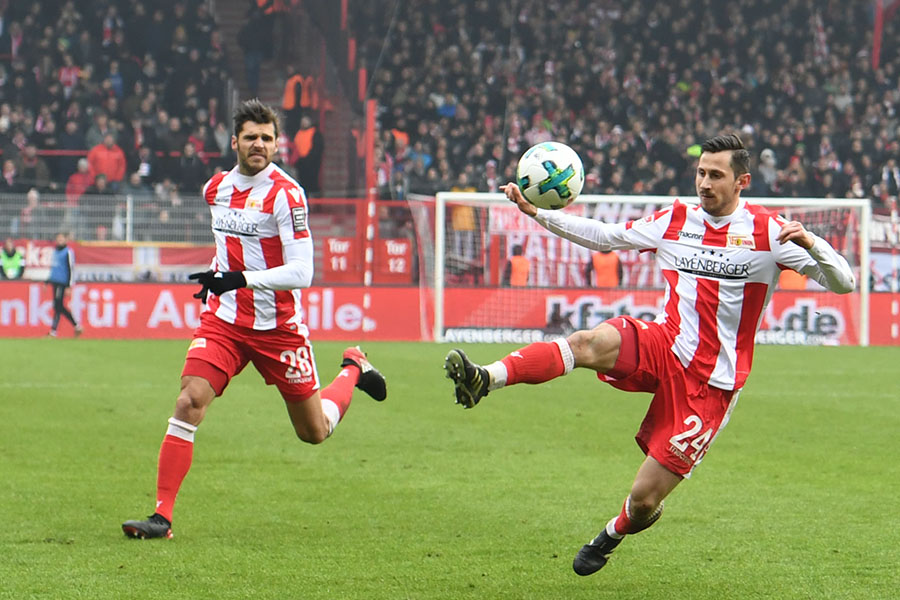
Fischer said that it was “cool” but he said it in the way a man in his mid-fifties would say something was cool. The way your father in law says something is cool. Because nothing sounded less cool, even though this was cool. Because Trimmel being captain is the coolest thing in the world.
– – – – – –
The press conference wound its way to an orderly end, the questions dried up, but Fischer wasn’t sure what to do. He is polite in a way that Keller could never really be when faced with the press and that Neuhaus grew to not be as his familiarity started to breed contempt for all of the same questions from all of the same faces. Fischer looked at Christian Arbeit, the master of ceremonies, wondering what to do next. “Good?”, he asked in what seemed a genuine attempt to find out if he’d done okay. Arbeit smiled at the new boss, and he lead him out the way they came in, chatting amiably.
“Good,” he replied.
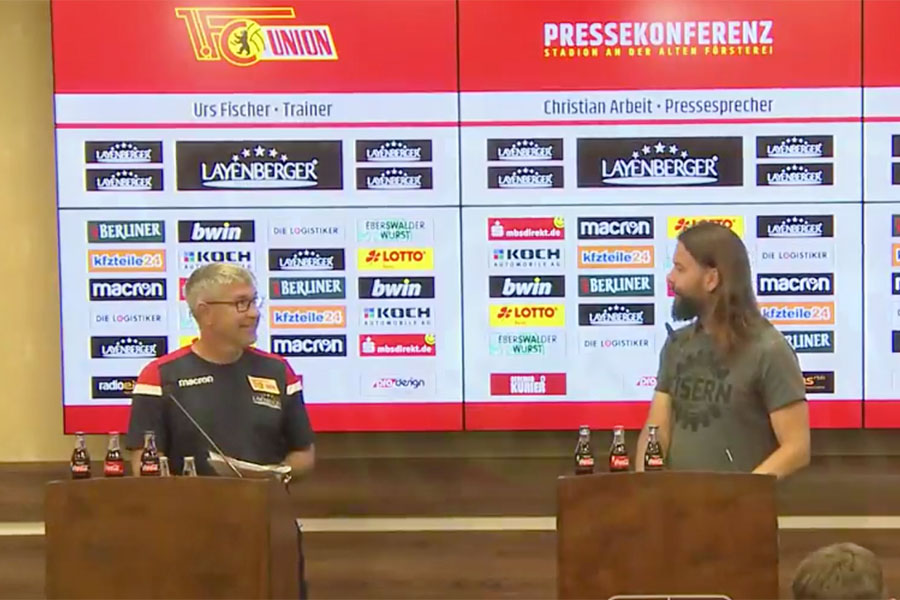
Entdecke mehr von Textilvergehen
Melde dich für ein Abonnement an, um die neuesten Beiträge per E-Mail zu erhalten.
Why in english? Bei allem Respekt, es nervt.
Eisern!
Wonderful text. Thank you.
@Textilvergehen: Der Hintergrund des Gastbeitrags bzw. des Autors würde mich interessieren…
@J.D.Coke: Du musst es nicht lesen. Merkst Du hoffentlich selbst.
@J.D.Coke Englisch ist die Muttersprache des Autors. Wer übersetzen kann, ist gerne dazu eingeladen. Wir haben das letzte Mal zu fünft zwei Wochen gebraucht. Ich habe letztlich lieber einen tollen englischsprachigen Text als keinen Text. Und nicht immer stehen im Hobbybereich die Ressourcen zur Verfügung, so eine Übersetzung zu stemmen.
@sportanwalt Jacob ist Engländer, hat lange für den Ex-Berliner geschrieben und das wundervolle Magazin No Dice gemacht – ein englischsprachiges Magazin über den Berliner Fußball. Viel und gerne über Union. Ich liebe seine Texte sehr, aber ich scheitere immer wieder an der wörtlichen Übersetzung. Man müsste es eher übertragen, und das ist was für Literatur-Übersetzer.
@sportanwalt,
was ich lesen muss und möchte, kannst du gerne mir überlassen. Es ist für die meisten sehr anstrengend, auf einer deutschsprachigen Seite mühevoll übersetzen zu müssen, wenn man einen Artikel über den 1.FC Union Berlin lesen möchte.
@J.D.Coke Ich verstehe ja, dass es für viele anstrengend ist, auf englisch zu lesen. Für viele sind Jacobs fantastischen Texte aber auch eine große Freude. Und womöglich ist die Schnittmenge zwischen beiden Gruppen gar nicht mal so klein.
Was wäre denn Deine Lösung? Auf die Texte zu verzichten? Sie nur zu veröffentlichen, wenn sie nach wochenlanger mühevoller Arbeit auch in deutsch vorliegen? Oder aber in Kauf nehmen, dass sporadisch auf dieser ansonsten weitgehend deutschsprachigen Seite auch ein Text erscheint, der nicht alle erreicht?
Ich bin sehr für letzteres.